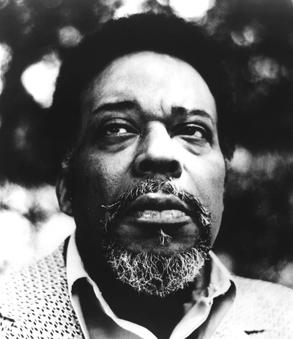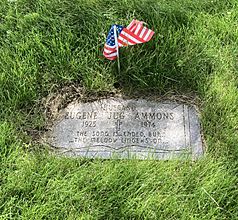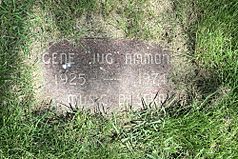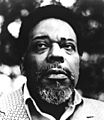Gene Ammons facts for kids
Quick facts for kids
Gene Ammons
|
|
|---|---|
 |
|
| Background information | |
| Birth name | Eugene Ammons |
| Also known as | "Jug", "The Boss" |
| Born | April 14, 1925 Chicago, Illinois, United States |
| Died | August 6, 1974 (aged 49) Chicago, Illinois, United States |
| Genres | Jazz |
| Occupation(s) | Musician |
| Instruments | Tenor saxophone |
| Years active | 1943–1974 |
Eugene "Jug" Ammons (born April 14, 1925 – died August 6, 1974) was a famous American jazz musician. He played the tenor saxophone. People also knew him as "The Boss."
Gene was the son of Albert Ammons, a well-known boogie-woogie piano player. Gene Ammons was loved for his easy-to-listen-to music. His sound often mixed jazz with soul music and R&B (Rhythm and Blues).
Biography
Gene Ammons was born in Chicago, Illinois. He learned music from a teacher named Walter Dyett at DuSable High School. Gene started getting noticed when he was just 18 years old. In 1943, he began touring with trumpeter King Kolax's band.
In 1944, he joined Billy Eckstine's band. While in this band, he played alongside other jazz greats like Charlie Parker and Dexter Gordon. Billy Eckstine gave him the nickname "Jug." This happened because straw hats ordered for the band did not fit Gene's head! One famous performance from this time was "Blowin' the Blues Away." It featured an exciting saxophone battle between Ammons and Gordon.
After 1947, Billy Eckstine started performing alone. Gene Ammons then led his own group. Famous musicians like Miles Davis and Sonny Stitt played with him. They performed at the Jumptown Club in Chicago. In 1949, Ammons joined Woody Herman's band. Then, in 1950, he formed a musical duo with Sonny Stitt.
The 1950s were a very busy time for Ammons. He made many popular recordings, like The Happy Blues in 1956. Many talented musicians played in his groups. These included Donald Byrd, John Coltrane, and Kenny Burrell.
Gene Ammons recorded for several record companies. These included Mercury, Chess, and Prestige Records. For most of his career, he worked with Prestige. After a period away from music, he returned in 1969. He then signed a very big contract with Prestige Records.
Gene Ammons passed away in Chicago on August 6, 1974. He was 49 years old. He is buried at Lincoln Cemetery in Blue Island, Illinois.
Playing Style
Gene Ammons and Von Freeman helped create the "Chicago school" of tenor saxophone playing. Ammons's style was influenced by other great saxophonists. These included Lester Young and Ben Webster. These artists made the saxophone sound even more expressive.
Ammons, along with Dexter Gordon and Sonny Stitt, helped mix these sounds with the new "bebop" style of jazz. Bebop used more complex melodies and rhythms. Gene Ammons was good at the technical parts of bebop. But he also kept his music connected to the blues and R&B. For example, his 1950 recording of "My Foolish Heart" became a hit. It appeared on Billboard Magazine's pop charts.
He is also seen as a founder of the soul jazz movement. This style became popular in the mid-1960s. It often featured a tenor saxophone and a Hammond B3 electric organ. Ammons had a rich, warm sound on his saxophone. He could make his instrument "talk" in many ways. His playing influenced later artists like Stanley Turrentine. However, Ammons was not very interested in the "modal jazz" style. This new style was being explored by musicians like John Coltrane at the same time.
Discography
Gene Ammons recorded many albums throughout his career. Here are a few examples:
As leader
- The Happy Blues (Prestige, 1956)
- Boss Tenor (Prestige, 1960)
- Jug (Prestige, 1961)
- The Boss Is Back! (Prestige, 1969)
- The Chase! with Dexter Gordon (Prestige, 1971)
With Sonny Stitt
- Boss Tenors in Orbit! (Verve, 1962)
- Soul Summit (Prestige, 1962)
- You Talk That Talk! (Prestige, 1971)
Images for kids
See also
 In Spanish: Gene Ammons para niños
In Spanish: Gene Ammons para niños
 | Emma Amos |
 | Edward Mitchell Bannister |
 | Larry D. Alexander |
 | Ernie Barnes |




